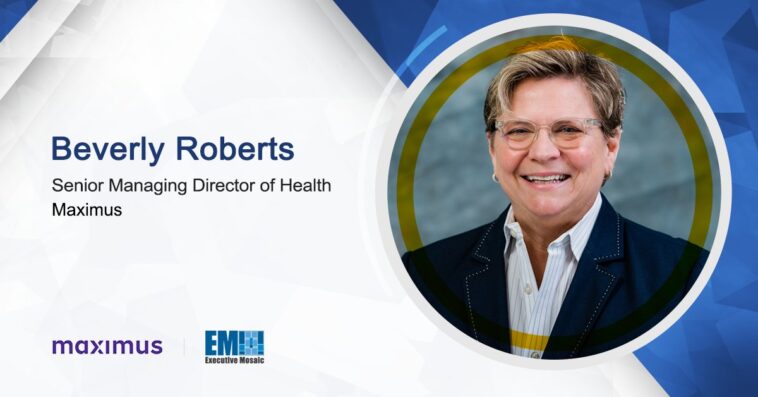Beverly Roberts began her career in healthcare as a researcher specializing in retroviruses. Her work brought her to the Centers for Disease Control and Prevention, where she continued her research while gaining skills in information technology. After 14 years with the agency, Beverly pivoted to the private sector, where she has held leadership roles with multiple large federal contractors.
In February, Roberts stepped into her current position as senior managing director of health at Maximus, where she is driven by the vision to shape the future of health into one that provides equitable, connected and positive outcomes for all.
Roberts recently sat down for an Executive Spotlight interview with ExecutiveBiz to discuss how the culture at Maximus contributes to successful service delivery. She illuminated the importance of data in improving health outcomes and highlighted emerging technologies that are transforming the public sector.
Tell us about the culture at Maximus. What aspects do you think are contributing most to the company’s success and helping to attract and retain top-level talent?
Our core values encourage collaboration, innovation and respect. When it comes to attracting and retaining talent, these are foundational elements. But what’s unique about Maximus is that the work we do is truly mission focused on helping deliver services that improve the lives of citizens, soldiers and Veterans. Like most companies, we offer comprehensive benefits, training and career development resources – but the level of impact we have is what really stands out. It is an incredible built-in motivator for prospective and current employees.
Our teams engage daily with the public in a very personal and meaningful way. We serve over 180 million citizens annually – about half the U.S. population. This includes fifteen million benefit management cases a day. Our people find this work is very impactful and like working for a company that supports better outcomes in peoples’ lives.
The mission attracts employees to Maximus, but what is helpful in retaining top talent is that the opportunity to continually elevate the customer’s experience is embedded in our service delivery. We have built in the capability to help employees produce innovative ideas, streamline their activities and learn from what they are hearing from citizens who call in to our contact centers – really hearing what the customer needs and what their experience is.
When we combine this learning with our values of compassion and collaboration, it gives us new, innovative pathways to improve our services. We are extremely focused on human-centered design and customer satisfaction, whether it be for our clients or for the citizens they serve. That in and of itself drives this continual satisfaction in the work and creates a natural cycle where our employees are often appreciated, not just by the clients and not just by the continued opportunity to do the work, but also by the citizens they serve.
Recognition is another big part of our culture. For example, we are very fortunate to have been part of two critical health programs that received Service to the Citizen Awards in 2022 and 2023, respectively. One of them was for helping the Centers for Medicare & Medicaid Services improve accessibility and the second for our work to help the CDC rapidly scale support for citizens during the COVID-19 pandemic.
For the Centers for Disease Control and Prevention as part of the COVID-19 response, we ran the CDC information desk, or CDC-INFO, which is an important part of the agency’s response infrastructure in dealing with large scale epidemics. Through this project, we were able to help the CDC quickly and incrementally scale their ability to provide critical information to the public from the beginning of the pandemic to March of 2020, when we saw an apex of around 222,000 calls in that month.
We transitioned CDC-INFO to a 24/7 call contact center support and we continuously trained and learned from data insights to improve engagement with the public. and learned along the way to constantly improve. This is one example of our central role in helping agencies play critical roles in citizen lives, build trust and improve health outcomes.
Staying focused on what we choose to do as work is a big part of keeping our employees engaged and feeling rewarded and satisfied. It is not just about what we provide as a company in terms of benefits, but what we provide as the opportunity to work and support the nation.
To do that work of supporting the nation, what do you think will help federal health agencies have the biggest impact? And what is shaping the industry that helps them do it?
There is a lot of data out there, and we at Maximus see that harnessing it is imperative to improving health outcomes. Harnessing data requires not just understanding its content, but also the context of how it is presented. If you are going to use it as decision-making support, you must also understand how the data is transformed into information and knowledge. What we need more of in the future is better and readily accessible knowledge that has been validated – data that we know how to use and implement in real time. The challenge is what we do with the data we have.
At Maximus, we are in the business of doing a lot of assessments, and as we our work is core to participate in the healthcare journey for citizens, soldiers and Veterans. We believe in a connected view across programs and services to provide a whole health outcomes whole health arena. Doing so has resulted in an extension across the full spectrum of healthcare delivery in many ways across the various types of work that we do. We can see data potentially being used to examine how the design of a policy or program impacts health outcomes. We can also use enhanced data collection to help determine the future impact not only for an individual, but for a community, a state and potentially the whole nation. Harnessing data can be very impactful, and by applying appropriate tools we can derive real-time insights from data to empower positive future outcomes.
Data is central to supporting healthcare processes, and our process expertise and understanding of their associated policies gives us the unique opportunity to streamline processes within the healthcare ecosystems we serve. Specifically, the data we collect and use daily for government programs can lead to better understanding of the issues that impact citizens in their healthcare journey and potentially lead to better outcomes and lower burdens on providers. All of these elements combined offer the potential to reduce enterprise costs for services, implement innovative technology and improve capacity within the health system.
Which emerging technologies do you anticipate will have the greatest impact on the federal landscape in the next few years?
Right now, artificial intelligence is the leading emerging tech topic, but it is not the only one. The use of robotics, avatars and simulation technologies are important, especially in citizen services.
I think emerging technologies might lend themselves to the management, communication and exchange of information. And while AI-powered technologies will be implemented around those business functions, there are opportunities to continue to focus on innovative customer experience enhancements and better use of technology for things like interpreting natural language or developing intelligent ways to process documentation such as claims and eligibility forms. Citizens are increasingly on the move, and there is tremendous opportunity to focus on mobile technologies – everything from applications to help localizing medical care in healthcare deserts.
There is also so much that can be accomplished in data integrity, cyber threat resilience and reducing exposure to hacks given that medical data is a top target for cyberthreats. We need to continue to evolve how we safeguard that information and data and the technologies used to secure information to make sure that it is safe at rest and in movement. There are many AI-enabling tools that can help support that. There is also a lot of fundamental, emerging technology that still needs to be refined and applied appropriately, not just to improve speed to access and speed to care, but also to give the public confidence in how they are receiving information and care along the way. There is still a bridge to cross, and we need to be ethical and judicious in how we think about AI-enabling tools and refining existing technology.
Which emerging technologies do you anticipate will have the greatest impact on accelerated, meaningful tech growth for the U.S. in the next few years?
I think the greatest impact will be how we leverage AI and social media platforms and what the governance around those will be. While these technologies hold many great opportunities to give people access to information that can be used to make their lives better, there is significant risk of disinformation with AI platforms and AI content and image generators. Social media platforms are now very impactful spaces that people use to determine how they should conduct themselves in all facets of their lives, and we need to make sure people can discern between useful and truthful information versus information that might be harmful.
This is a big opportunity that will experience accelerated growth in the federal landscape because there is a strong call for action to get in front of AI technology, which is currently ahead of the policy. The challenge will be bringing policy and technology into closer alignment. It will take concentrated effort, but it is an opportunity for companies like Maximus and others in the marketplace to help improve outcomes by using emerging technology to serve citizens with integrated whole health experiences that make their lives better.





